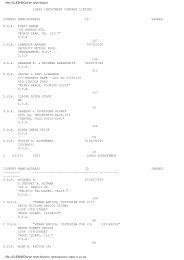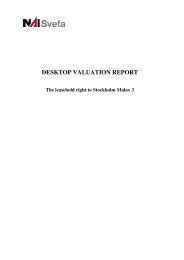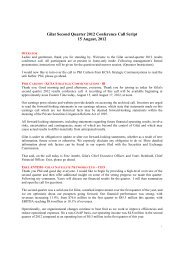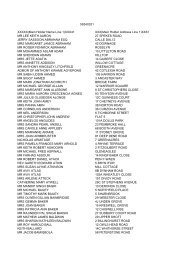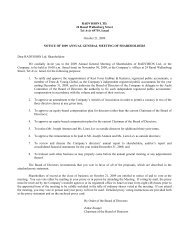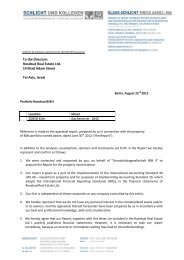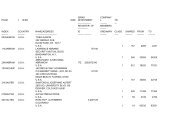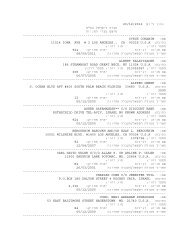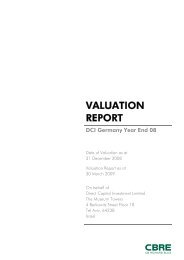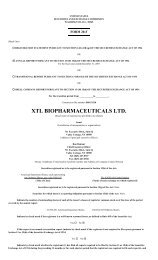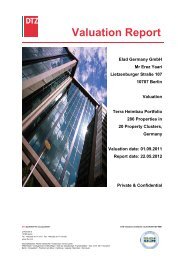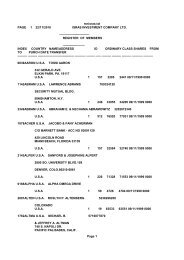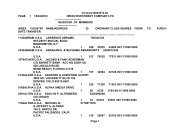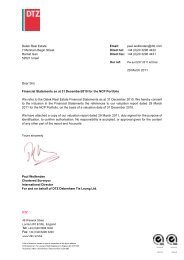RETALIX LTD.
RETALIX LTD.
RETALIX LTD.
Create successful ePaper yourself
Turn your PDF publications into a flip-book with our unique Google optimized e-Paper software.
Generally, up until the 2006 tax year, capital gains tax was imposed on Israeli resident individuals at a rate of 15% on real gains derived on or after<br />
January 1, 2003 from the sale of shares in, among others, (i) Israeli companies publicly traded on a recognized stock market in a country that has a treaty<br />
for the prevention of double taxation with Israel (such as Nasdaq), or (ii) companies dually traded on both the TASE and Nasdaq or another recognized<br />
stock market outside of Israel (such as Retalix). This tax rate was contingent upon the shareholder not claiming a deduction for financing expenses in<br />
connection with such shares (in which case the gain was generally taxed at a rate of 25%), and did not apply to: (1) dealers in securities; (2) shareholders<br />
that report in accordance with the Adjustments Law; or (3) shareholders who acquired their shares prior to an initial public offering; or (4) the sale of<br />
shares to a relative (as defined in the Tax Ordinance).<br />
As of January 1, 2006, the tax rate applicable to capital gains derived from the sale of shares, whether listed on a stock market or not, is 20% for Israeli<br />
individuals, unless such shareholder claims a deduction for financing expenses in connection with such shares, in which case the gain will generally be<br />
taxed at a rate of 25%. Additionally, if such shareholder is considered a “significant shareholder” at any time during the 12-month period preceding such<br />
sale, i.e., such shareholder holds directly or indirectly, including with others, at least 10% of any means of control in the company, the tax rate will be 25%.<br />
Israeli companies are subject to the corporate tax rate on capital gains derived from the sale of shares, unless such companies were not subject to the<br />
Adjustments Law (or certain regulations) at the time of publication of the aforementioned amendment to the Tax Ordinance that came into effect on<br />
January 1, 2006, in which case the applicable tax rate is 25%. However, the foregoing tax rates will not apply to: (i) dealers in securities; and (ii)<br />
shareholders who acquired their shares prior to an initial public offering (that may be subject to a different tax arrangement).<br />
The tax basis of shares acquired prior to January 1, 2003 will be determined in accordance with the higher of the average closing share price in the three<br />
trading days preceding January 1, 2003, and the cost of the shares. However, a request may be made to the tax authorities to consider the actual adjusted<br />
cost of the shares as the tax basis if it is higher than such average price.<br />
Non-Israeli residents are exempt from Israeli capital gains tax on any gains derived from the sale of shares publicly traded on the TASE, provided such<br />
gains did not derive from a permanent establishment of such shareholders in Israel, and are exempt from Israeli capital gains tax on any gains derived from<br />
the sale of shares of Israeli companies publicly traded on a recognized stock market outside of Israel (including Nasdaq), provided however that such<br />
shareholders did not acquire their shares prior to an initial public offering, that such capital gains are not derived from a permanent establishment in Israel,<br />
and that such shareholders are not subject to the Adjustments Law. However, non-Israeli corporations will not be entitled to such exemption if an Israeli<br />
resident (i) has a controlling interest of 25% or more in such non-Israeli corporation, or (ii) is the beneficiary of or is entitled to 25% or more of the<br />
revenues or profits of such non-Israeli corporation, whether directly or indirectly.<br />
In certain instances where our shareholders may be liable to Israeli tax on the sale of their ordinary shares, the payment of the consideration may be<br />
subject to the withholding of Israeli tax at the source.<br />
In addition, under the convention between the United States and Israel concerning taxes on income, as amended, or the U.S.-Israel Tax Treaty,<br />
generally, Israeli capital gains tax will not apply to the sale, exchange or disposition of shares by a person who holds the shares as a capital asset and who<br />
qualifies as a resident of the United States within the meaning of the U.S.-Israel Tax Treaty, and who is entitled to claim the benefits available under the<br />
U.S.-Israel Tax Treaty. However, this exemption will not apply if (i) the treaty U.S. resident holds, directly or indirectly, shares representing 10% or more<br />
of our voting power during any part of the 12-month period preceding the sale, exchange or disposition, subject to specified conditions, or (ii) the capital<br />
gains from such sale, exchange or disposition can be allocated to a permanent establishment in Israel. In this case, the sale, exchange or disposition would<br />
be subject to Israeli tax, to the extent applicable. However, under the U.S.-Israel Tax Treaty, the treaty U.S. resident would be permitted to claim a credit<br />
for the taxes against the U.S. federal income tax imposed on the sale, exchange or disposition, subject to the limitations in U.S. laws applicable to foreign<br />
tax credits. The U.S.-Israel Tax Treaty does not relate to U.S. state or local taxes.<br />
Taxation of Dividends Applicable to Non-Resident Shareholders<br />
Non-residents of Israel are subject to Israeli income tax on income accrued or derived from sources in Israel, including passive income such as<br />
dividends, royalties and interest. On distributions of dividends, other than bonus shares and stock dividends, income tax is withheld at the source at the<br />
following rates: (i) for dividends distributed prior to January 1, 2006 - 25%; (ii) for dividends distributed on or after January 1, 2006 - 20%, or 25% for a<br />
shareholder that is considered a significant shareholder at any time during the 12-month period preceding such distribution, unless a different rate is<br />
provided in a treaty between Israel and the shareholder’s country of residence. As aforesaid, dividends of income generated by an Approved Enterprise are<br />
subject to withholding tax at a rate of 15%.<br />
Under the U.S.-Israel Tax Treaty, the maximum tax on dividends paid to a holder of shares who is a treaty U.S. resident is 25% or 15% if the dividends<br />
are generated by an Approved Enterprise (or Benefited Enterprise). Such tax rate is reduced to 12.5% for dividends not generated by an Approved<br />
Enterprise (or Benefited Enterprise) if the non-resident is a U.S. corporation and holds 10% or more of our voting power during the part of the tax year that<br />
precedes the date of payment of the dividend and during the whole of its prior tax year, and provided that not more than 25% of the Israeli company’s gross<br />
income consists of interest or dividends.<br />
85



